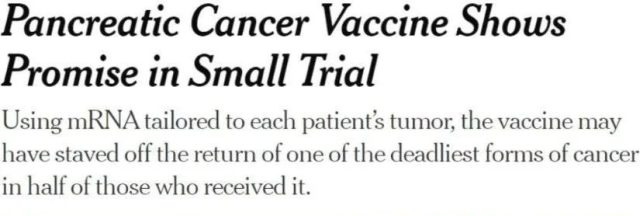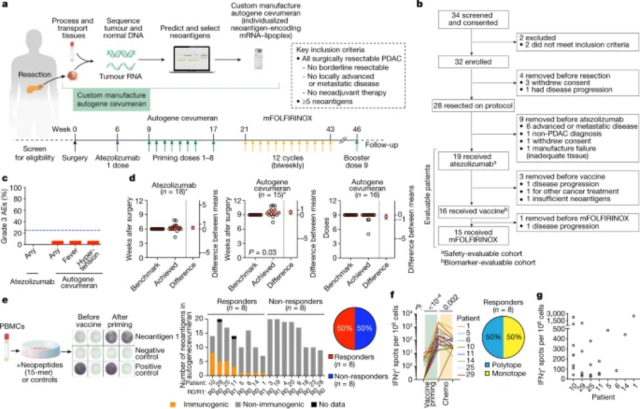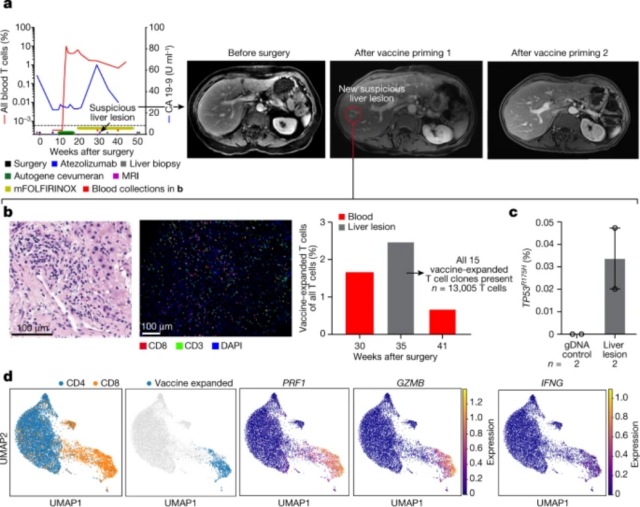mRNA vaccine effectively prevents the recurrence of pancreatic cancer
- Normal Liver Cells Found to Promote Cancer Metastasis to the Liver
- Nearly 80% Complete Remission: Breakthrough in ADC Anti-Tumor Treatment
- Vaccination Against Common Diseases May Prevent Dementia!
- New Alzheimer’s Disease (AD) Diagnosis and Staging Criteria
- Breakthrough in Alzheimer’s Disease: New Nasal Spray Halts Cognitive Decline by Targeting Toxic Protein
- Can the Tap Water at the Paris Olympics be Drunk Directly?
mRNA vaccine effectively prevents the recurrence of pancreatic cancer
- Should China be held legally responsible for the US’s $18 trillion COVID losses?
- CT Radiation Exposure Linked to Blood Cancer in Children and Adolescents
- FDA has mandated a top-level black box warning for all marketed CAR-T therapies
- Can people with high blood pressure eat peanuts?
- What is the difference between dopamine and dobutamine?
- How long can the patient live after heart stent surgery?
The advent of the mRNA vaccine that effectively prevents the recurrence of pancreatic cancer is regarded by experts as a “cancer vaccine milestone”!
Recently, BioNTech released information saying that it has developed a breakthrough pancreatic cancer vaccine, which can cause an immune response in half of the treated patients, and no recurrence of cancer was observed during the study.
This means that the vaccine may have a potential effect on preventing the recurrence of pancreatic cancer, which is regarded by experts as a “cancer vaccine milestone” .

Information about pancreatic cancer
Pancreatic cancer is a highly lethal cancer with a relatively high mortality rate. Pancreatic cancer is often called the “silent killer” because patients usually have no obvious symptoms in the early stage, leading to the spread to other sites by the time it is diagnosed in the late stage, limiting effective treatment methods.
In 2023, approximately 64,050 people in the United States will be diagnosed with pancreatic cancer and more than 50,550 will die from the disease. It is currently the third leading cause of cancer-related death in the United States after lung and colon. Experts predict that by 2030 it will become the second leading cause of cancer-related death in the United States.

The data comes from pancreatic.org
According to the World Health Organization (WHO), the 5-year survival rate of patients with pancreatic cancer is very low, about 12%. Most patients tend to be diagnosed at an advanced stage, so treatment is less effective. For a small proportion (15%) of people diagnosed with endemic cancer, the 5-year survival rate was 44%.
 The data comes from pancreatic.org
The data comes from pancreatic.org
The usual treatment options for pancreatic cancer including surgery, radiation therapy, and chemotherapy are options for prolonging survival or relieving symptoms, but few patients are cured.
Because the early symptoms of pancreatic cancer are subtle and often overlooked or confused with other common problems, it can be difficult to treat effectively in its early stages.
Surgical removal of the tumor is feasible in less than 20 percent of patients diagnosed with pancreatic cancer, but it is often found at an advanced stage and has spread beyond the pancreatic organ.
Prevention and early diagnosis are very important to improve the survival rate of pancreatic cancer.
mRNA vaccine prevents pancreatic cancer recurrence
A breakthrough vaccine for pancreatic cancer has arrived, stopping the disease from recurring in half of those who were vaccinated.
The vaccine was developed as an international collaboration between doctors at Memorial Sloan Kettering Cancer Center in New York City, Germany’s BioNTech and Swiss pharmaceutical company Roche.
BioNTech leads a groundbreaking pancreatic cancer vaccine study. It prevented relapse in 50 percent of patients treated for the deadly disease.
In the study, published in the journal Nature, researchers at the New York Cancer Center collected cell samples from the tumors of more than a dozen patients and sent them to Germany. The cancer cells were analyzed by BioNTech’s laboratory and analyzed. Created a vaccine against pancreatic cancer recurrence.
This mRNA vaccine specifically targets the protein in the patient’s tumor. When pancreatic cancer surgery patients are vaccinated, their bodies produce a new class of protein that triggers the immune system to “clear up” it.
In addition, the body’s immune system is “on alert” to this protein. This also means that if the cancer recurs, the patient’s immune system will quickly fight it and prevent it from spreading.
Currently, the mRNA vaccine costs about $100,000 to produce per dose. However, the personalized mRNA vaccine is safe, feasible and immunogenic in patients with pancreatic cancer . The company also used the same technology to develop the widely used Pfizer COVID-19 vaccine (Pfizer).

The figure illustrates that individualized mRNA neoantigen vaccines are safe, feasible, and immunogenic in PDAC patients. The image is from the journal Nature.
In the research trial, 16 patients with preexisting pancreatic cancer received the vaccine intravenously within nine weeks of surgery to remove the tumor.
Three days later, a blood sample was taken to determine whether the drug had successfully generated new cancer-fighting antibodies.
Eight patients showed increased levels of T cells, a type of white blood cell that fights the disease, while the other half of the study group showed no immune response, the results showed .
At the same time, each patient will continue to receive chemotherapy and be regularly monitored by doctors to screen for cancer recurrence.
The researchers followed the patients for 18 months, and among those who did not respond to the vaccine , the cancer basically recurred around 13 months after surgery.
In responding patients, none of the cancers have recurred so far. Further investigation found that one of the patients’ vaccine antibodies even successfully fended off another type of liver cancer cell.
 Pictured, T cells expanded by the vaccine published in Nature can infiltrate micrometastases. Image courtesy of Nature.com.
Pictured, T cells expanded by the vaccine published in Nature can infiltrate micrometastases. Image courtesy of Nature.com.
The researchers believe that the mRNA vaccine is mainly concentrated in the patient’s spleen, which is a key location for the development of a large number of T cells that attack tumors.
If the patient’s tumor removal surgery includes the removal of the spleen, the vaccine effect may not be so obvious. However, it is only inferred at present, and large-scale research is still needed before results can be drawn.
Pancreatic cancer is one of the most lethal and difficult-to-treat malignancies.
According to statistics, about 88% of patients eventually die. Although surgical resection can remove part of the tumor, 90 percent of patients still experience a recurrence within seven to nine months.
Although chemotherapy can prolong the survival time of patients, it can rarely achieve complete cure. Radiotherapy, immunotherapy, and targeted therapy all have limited efficacy in treating pancreatic cancer.
Although an mRNA vaccine that prevented pancreatic cancer from recurring was effective in only half of the subjects tested, the breakthrough in vaccine technology raised hopes in the medical community, where finding a vaccine to treat and suppress cancer has long been a goal of the medical field .
“This is the first apparent success of an mRNA vaccine for pancreatic cancer, and I would call it a success even though the research is preliminary,” said Aniban Mitra, a disease specialist at Texas State University MD Anderson Cancer Center. “By this standard, this is already a milestone in cancer research,” said Dr Anirban Maitra.
At this stage, another major goal of the medical community is to reduce the cost of vaccines. The cost of the mRNA vaccine studied this time is about 100,000 yuan per dose, which also means that if it is on the market, this vaccine will be very expensive for consumers. .
References:
Pancreatic Cancer Facts
https://www.nature.com/articles/s41586-023-06063-y?utm_medium=affiliate&utm_source=commission_junction&utm_campaign=CONR_PF018_ECOM_GL_PHSS_ALWYS_DEEPLINK&utm_content=textlink&utm_term=PID100032693 &CJEVENT=3f965783f13211ed81869bf50a1cb82a
https://www.dailymail.co.uk/health/article-12069487/Pancreatic-cancer-vaccine-prevents-HALF-patients-tumors-returning.html
mRNA vaccine effectively prevents the recurrence of pancreatic cancer
(source:internet, reference only)
Disclaimer of medicaltrend.org
Important Note: The information provided is for informational purposes only and should not be considered as medical advice.



